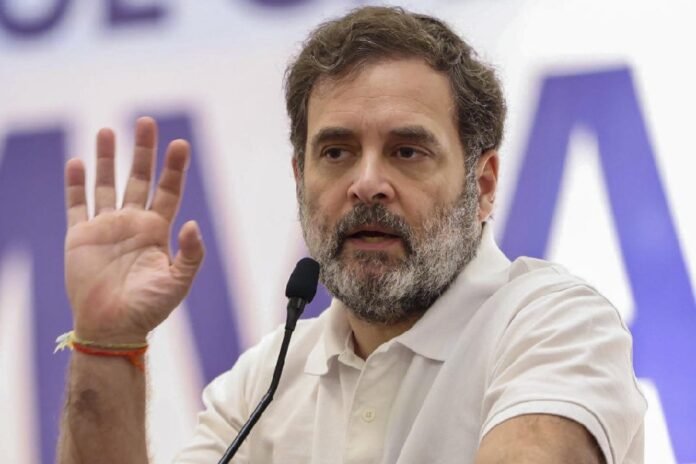The Indian democratic process, the world’s largest and most vibrant, has always prided itself on its integrity, transparency, and robustness. However, in recent months, the Indian political landscape has witnessed a growing uproar over allegations of electoral fraud and voter data theft. At the center of this storm is Congress leader Rahul Gandhi, who has openly raised concerns about the alleged theft of one lakh voter identities and the presence of fake votes during recent elections. His statements have reignited a nationwide debate on the security and sanctity of the Indian electoral system.
This article explores the issue from all angles, including the allegations made by Rahul Gandhi, responses from the Election Commission and rival parties, historical context, implications for democracy, and what the future may hold for India’s electoral reforms.
The Allegations: What Did Rahul Gandhi Say?
During a press interaction and multiple public speeches, Rahul Gandhi claimed that over one lakh fake votes were cast in a single constituency and that voter data was being misused for electoral manipulation. Gandhi alleged that the Bharatiya Janata Party (BJP) had access to and control over vast databases containing personal information of voters, which was being used to engineer election outcomes. He emphasized that this was not a minor clerical error but an orchestrated, systemic breach that compromised democratic fairness.
Rahul Gandhi stated:
“We have credible evidence to suggest that the data of more than one lakh voters was stolen and used to cast fake votes. This is not democracy. This is data-driven dictatorship.”
He demanded a high-level probe into the matter and called on the Election Commission of India (ECI) to uphold its constitutional responsibility of ensuring free and fair elections.
Context: Why This Allegation Matters
India is a country of over 950 million registered voters. Elections are conducted at massive scales, both for national and state legislatures. Trust in the Election Commission and the voting process is essential for the democratic system to function.
In a digital age where voter information is stored electronically, including Aadhaar-linked data, electoral rolls, and online campaign outreach, concerns around data privacy and electoral manipulation are becoming more pronounced. Allegations like those made by Rahul Gandhi strike at the core of electoral legitimacy.
Such claims, if proven true, could have significant consequences:
- Legal implications for the parties or individuals involved in the fraud.
- Loss of public trust in democratic institutions.https://www.business-standard.com/
- Erosion of electoral confidence in upcoming elections.
- Increased pressure on the ECI and judiciary to enact stronger safeguards.
The One Lakh Vote Controversy: Dissecting the Claim
Rahul Gandhi’s reference to “one lakh fake votes” specifically pointed to a particular constituency, although the exact location was not initially disclosed for legal reasons. Later media reports speculated that the constituency in question was located in Telangana, where voter list discrepancies and identity mismatches were observed during the state elections.
According to Gandhi’s team, independent scrutiny of the electoral rolls revealed:
- Duplicate entries for the same voters.
- Voters listed in multiple constituencies.
- Dead voters appearing on active rolls.
- Mismatched names, photos, or gender details.
They also claimed that during door-to-door surveys conducted by Congress workers, tens of thousands of voters denied having ever cast a vote, even though their names showed “voted” status in official records.
This raised fears that either electronic voting machines (EVMs) had been tampered with or that polling agents colluded to impersonate voters.
Election Commission’s Response
The Election Commission of India took note of the allegations and responded by saying it maintains strict protocols for electoral rolls and voter authentication. Officials claimed that:
- Voter identity is verified through photo ID checks at polling stations.
- EVMs are technologically secure and have undergone extensive testing.
- Duplicate or erroneous entries, if any, are rectified through periodic roll purification exercises.
However, critics argue that the Commission’s response was not proactive enough and lacked the transparency needed to reassure voters. Civil society groups have demanded that the ECI publish an independent audit report to verify or debunk the claims made by Rahul Gandhi.
BJP’s Rebuttal: Political Vendetta or Genuine Concern?
The BJP leadership dismissed Rahul Gandhi’s allegations as a desperate political move. They accused the Congress of spreading misinformation and attempting to delegitimize India’s electoral process after facing electoral defeats.
A BJP spokesperson stated:
“Rahul Gandhi is levelling wild allegations without any concrete proof. This is an insult to the Election Commission, to voters, and to Indian democracy itself.”
They also reminded that Congress had earlier questioned EVM credibility but never provided evidence. BJP leaders suggested that the Congress was trying to distract the public from its internal disunity and electoral underperformance.
Nevertheless, the BJP’s rebuttal failed to pacify all critics. Several neutral observers, including retired election commissioners, called for increased transparency and independent verification, instead of political mudslinging.
Role of Technology and Data Analytics in Elections
Rahul Gandhi’s data theft allegations have brought into focus the increasing role of technology and data analytics in modern-day political campaigning.
Political parties in India today use sophisticated tools for:
- Micro-targeted advertisements on social media.
- WhatsApp groups for voter communication.
- Booth-level data analytics to mobilize support.
- Automated calls and SMS campaigns.
Many experts argue that there is a thin line between legitimate data use and illegal data exploitation. With the rise of political consultancies and third-party data brokers, voters’ personal information is being harvested and possibly misused.
This has led to demands for:
- A comprehensive data protection law (which is still pending in Parliament).
- Stricter penalties for unauthorized access to voter information.
- A watchdog agency to monitor digital campaigning.
Legal and Constitutional Implications
Rahul Gandhi’s allegations, if substantiated, could open the door to a series of legal and constitutional battles:
- Violation of Representation of the People Act, 1951 – which penalizes corrupt electoral practices and impersonation.
- Breach of Right to Privacy – as laid down in the Supreme Court’s landmark 2017 judgment.
- Contempt of Electoral Process – which could invite judicial scrutiny of past election results.
Congress has indicated that it may take the matter to the Supreme Court of India if the Election Commission does not initiate a transparent investigation.
Public Reaction and Civil Society’s Role
Public opinion on this issue remains divided along political lines. Congress supporters have rallied behind Rahul Gandhi, praising him for raising vital questions about electoral integrity. On the other hand, BJP supporters have largely dismissed the claims as political propaganda.https://www.business-standard.com/
Independent civil society organizations like the Association for Democratic Reforms (ADR) and Common Cause have issued statements emphasizing the need for:
- Independent forensic audits of voter data.
- Public hearings on EVM and voter roll issues.
- Citizen participation in monitoring elections.
These organizations have also reiterated the need for greater accountability in election expenditures, candidate background checks, and campaign financing.
Historical Precedents and Patterns
Allegations of voter fraud are not new to India. Over the years, various political parties have accused each other of:
- Booth capturing
- Dummy voters
- Paid votes
- Use of muscle and money power
However, the scale and digital sophistication of the recent allegations mark a new chapter in Indian politics. The issue is no longer about manual manipulation but about algorithmic influence, data profiling, and tech-enabled voter impersonation.
The Cambridge Analytica scandal during the 2019 elections had already set alarm bells ringing. Now, with Rahul Gandhi’s claims, it appears that electoral fraud in India may have entered a more dangerous and invisible phase.https://indianexpress.com/
Future of Electoral Reforms in India
In light of these allegations, experts are calling for a comprehensive electoral reform package, which may include:
- Mandatory voter roll audits before every election.
- Biometric verification at polling booths.
- Stringent data protection laws for political parties.
- Cap on digital ad spending during campaigns.
- Real-time disclosure of electoral bonds and donations.
Additionally, the Election Commission must consider increasing citizen engagement, building trust through live streaming of counting processes, and strengthening whistleblower protections for election officials.
Rahul Gandhi’s Political Gamble
Rahul Gandhi’s aggressive stance on the fake votes issue may be seen as a political gamble. With the 2026 General Elections on the horizon, Gandhi is clearly attempting to position himself as a defender of democratic values and protector of voter rights.https://indianexpress.com/
His strategy seems aimed at:
- Reigniting the Congress party’s relevance in national politics.
- Drawing attention to alleged electoral malpractice.
- Framing the BJP as an authoritarian party using data for manipulation.
Whether this narrative will resonate with the Indian electorate remains to be seen. Much will depend on how the investigation unfolds, how effectively Congress can back its claims, and whether the issue strikes a chord with first-time and urban voters who are most sensitive to data privacy.



